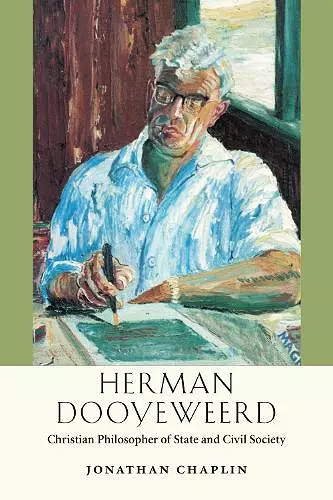Herman Dooyeweerd
Christian Philosopher of State and Civil Society
Format:Paperback
Publisher:University of Notre Dame Press
Published:15th Feb '16
Should be back in stock very soon

The twentieth-century Dutch philosopher Herman Dooyeweerd (1894–1977) left behind an impressive canon of philosophical works and has continued to influence a scholarly community in Europe and North America, which has extended, critiqued, and applied his thought in many academic fields. Jonathan Chaplin introduces Dooyeweerd for the first time to many English readers by critically expounding Dooyeweerd’s social and political thought and by exhibiting its pertinence to contemporary civil society debates.
Chaplin begins by contextualizing Dooyeweerd’s thought, first in relation to present-day debates and then in relation to the work of the Dutch philosopher Abraham Kuyper (1837–1920). Chaplin outlines the distinctive theory of historical and cultural development that serves as an essential backdrop to Dooyeweerd’s substantive social philosophy; examines Dooyeweerd’s notion of societal structural principles; and sets forth his complex classification of particular types of social structure and their various interrelationships. Chaplin provides a detailed examination of Dooyeweerd’s theory of the state, its definitive nature, and its proper role vis-à-vis other elements of society. Dooyeweerd’s contributions, Chaplin concludes, assist us in mapping the ways in which state and civil society should be related to achieve justice and the public good.
“[Herman Dooyeweerd] is loaded with provocative ideas, arguments, questions, and proposed revisions to Dooyeweerd’s philosophy. Those who know the work of Dooyeweerd will find the book illuminating and thought provoking. Those who are new to Dooyeweerd will find the book a helpful introduction, though it cannot make Dooyeweerd’s difficult and complex philosophy less difficult and complex than it is. The book is an important step forward in Dooyeweerd studies.” —Philosophia Reformata
“[Chaplin’s book] will provide those new to Dooyeweerd studies with an introduction that is both accessible and competent. . . . A clear strength of this book is that it does not assume any detailed prior understanding of Dooyeweerd’s systematic philosophy.” —Pro Rege
“Chaplin has written a masterful book. He has partaken deeply of a profoundly Christian theorist, and the fruit of his reflection is an incisive text written in a palatable idiom that is (largely) free of the original Dutch Reformed dialect and convoluted linguistic inventions. More importantly, it is a rare author who can, in one book, introduce and summarise the work of a great thinker, critically assess the value of that thinking, and then utilize it in fashioning his own constructive proposal—and do all that in a clear and engaging manner.” —Studies in Christian Ethics
". . . if you are working in social theory or political philosophy—actually, if you have any personal or professional interest in reading philosophy—or if you are intrigued by ways in which the ideas of Abraham Kuyper can be nuanced and brought to bear on the social and political questions of the 21st century, I recommend this book to you with unbridled enthusiasm." —Books and Culture
"To unpack Dooyeweerd is no small task, especially given his penchant for neologisms and a highly nuanced use of common vernacular. Given the challenge of such an undertaking, one can appreciate Chaplin's cumulative exposition of Dooyeweerd's thought; his skillful development provides an effortless transition from Chaplin's unique philosophy to his distinct political and social thought to the application of both in contemporary issues." —Journal of Church and State
“As intellectual heir to Abraham Kuyper . . . Dooyeweerd might seem to belong to an earlier generation of Christian political thought, amongst the Christian Democrat thinkers who opposed Nazism and contributed to the post-war reconstruction of Europe . . . Chapin situates him in more contemporary debates by drawing attention to his critique of liberalism, or the ‘humanistic ground motive’ as he calls it, and his account of ‘Christian pluralism’ and how this might contribute to recent debates about Civil Society.” —Modern Theology
“Jonathan Chaplin offers us a thorough, lucid, widely accessible, and reliable guide (critical but deeply sympathetic), to the philosophy of Herman Dooyeweerd, especially his philosophy of law, society, and politics in a way that should surely bring illumination to the uninitiated and perplexed reader of this undoubtedly important but neglected Christian (Reformed Protestant) thinker of the twentieth century.” —Journal of Markets and Morality
“Given the challenge of such an undertaking, one can appreciate Chaplin’s cumulative exposition of Dooyeweerd’s thought; his skillful development provides an effortless transition from Chaplain’s unique philosophy to his distinct political and social thought to the application of both in contemporary issues . . . . More sophisticated readers will appreciate the realistic portrait Chaplin paints of Dooyeweerd’s thought, one that rescues Dooyeweerd’s important contribution to political and social theory from its obtuse philosophical husk and places it back into the center of the contemporary debate.” —Journal of State and Religion
“Herman Dooyeweerd was both deep and original. Much of his writing is an articulation of rather undeveloped lines of thought in his Dutch predecessor, Abraham Kuyper. In the course of his exposition, Chaplin effectively highlights Dooyeweerd's significance for a theory of civil society and for present-day social theory in general." —Nicholas Wolterstorff, Yale University and the Institute for Advanced Studies, University of Virginia
"Finally, an authoritative book that brings to brilliant light and life Herman Dooyeweerd’s Christian philosophy of law, politics, and society. For the past half century, the profound and original teachings of this prolific Dutch sage have been lost on most readers. Jonathan Chaplin has rescued Dooyeweerd from his own obscure prose, poor translations, and cultic mystique to reveal his astonishing and engaging insights into our lives as persons and peoples, rulers and citizens, preachers and parishioners, parents and children. This will be the go-to book on Dooyeweerd for many years to come." —John Witte, Jr., Emory University
- Winner of Herman Dooyeweerd Prize from the Association for Reformational Philosophy 2016 (United States)
ISBN: 9780268023126
Dimensions: 229mm x 152mm x 24mm
Weight: 620g
464 pages